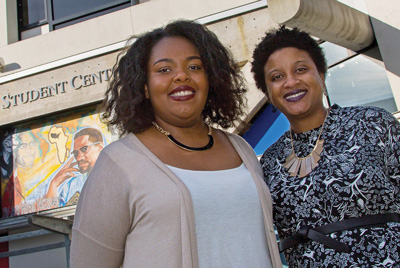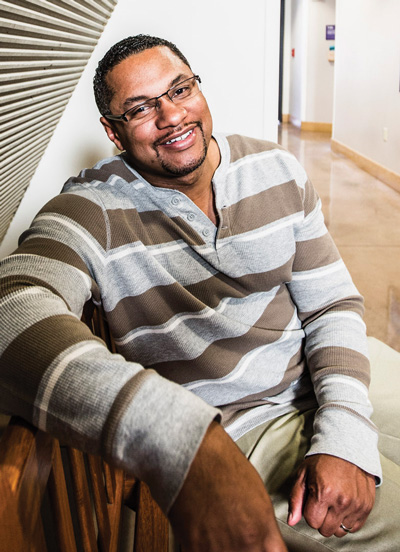Debate Duo Bests Harvard • Ready, Set — Shop! • More Access, More Opportunity
Debate Duo Beats Harvard

Debate champions Aliyah Shaheed, left, and Genelle Murray. Photo by Andrew Corpuz.
SENIORS ALIYAH SHAHEED AND GENELLE MURRAY made SF State history in January when they went head-to- head with the nation’s top-ranked, undefeated debate team from Harvard — and won.
Shaheed and Murray were among members of three SF State teams that joined speech and debate competitors from approximately 35 colleges and universities, including Harvard, Baylor, Emory and Georgetown, at the Cal Swing national invitational tournament. The competition, held at University of California, Berkeley, is one of the biggest in the country.
“This is a historic win, because it’s very rare for San Francisco State to beat the top team at a four-year university that has such tremendous money and training,” said Teddy Albiniak, SF State’s forensics director.
Shaheed and Murray’s winning strategy is simple: Speak your truth. “That is our whole entire goal — to make sure that you have the agency and the advocacy to really speak up for yourself and to live and speak in your truth,” Murray said.
Teams throughout the country debate on the same topic, called a resolution, for the entire year, Shaheed explained. The 2015-16 resolution was: “The United States should significantly reduce its military presence in one or more of the following: the Arab states of the Persian Gulf, the Greater Horn of Africa, Northeast Asia.”
“Our approach is that before you can discuss inter- national issues, you need to discuss issues happening domestically,” Shaheed said. “We focus on anti-blackness. We discuss our experiences as black women here. We discuss police violence and the Black Lives Matter movement. Those are all very key aspects to our debate.”
The pair went on a month later to become the first SF State team to win the regional championship at University of Southern California, securing them the top seed from the state at the National Debate Tournament held in New York.
Watch video of Shaheed and Murray discussing their debate style at magazine.sfsu.edu/debaters.
Ready, Set — Shop!

THE FINISH LINE is in sight, the rush of victory just past the cash register, the trophy flung hastily into a shopping cart.
For some, shopping is akin to athletic competition, according to research by San Francisco State’s Kathleen O’Donnell, associate dean of the College of Business, and Judi Strebel, chair of the marketing depart- ment. The two defined what it means to be a “sport shopper,” a new type of consumer, in the January Journal of Retailing and Consumer Services.
“This is somebody who takes great pride in their ability to get the thing they want at a discount,” O’Donnell said. “It’s not about spending the least. It’s about saving the most.”
O’Donnell was lead author of the study “The thrill of victory: women and sport shopping,” co-authored by Strebel and Gary Mortimer of Queensland University.
The scholars define a sport shopper as someone who can afford to pay full price but who bargain hunts for the thrill and enjoys outsmarting the retail system.
A sport shopper remembers with specificity the stories behind bargain items in her closet. Additionally, while a runner might train for a race and map the route, a sport shopper gets to know store layout and merchandising patterns and pre-plans outings based on how much time she has.
O’Donnell and Strebel expect their profile to better inform retailers who haven’t considered the sport shopper in their marketing. They plan to study sport shoppers further in future research.
More Access, More Opportunity

Jason Bell (B.A., ’05; M.S., ’11).
SF STATE WILL LEAD a statewide effort to expand college access for those who are or have been incarcer- ated thanks to a $500,000 “Renewing Communities” grant from the Opportunity Institute.
Seven California State University campuses will establish similar programs, modeled after SF State’s Project Rebound, that help participants earn their degrees and dramati- cally reduce the likelihood they will return to incarceration. Participating campuses are: Bakersfield, Fresno, Fullerton, Pomona, Sacramento, San Bernardino and San Diego. Project Rebound was established in 1967 by John Irwin, an SF State professor who had been incarcerated.
“I am proud that we are leading the effort to provide more people the opportunities offered through earning their degree,” said SF State President Les Wong.
Project Rebound offers special admissions for men and women who may not normally qualify for CSU acceptance because of aca- demic deadlines and minor academic defi- ciencies. Once on campus, Project Rebound provides participants food vouchers, BART tickets and money for books and connects them to student interns who help them navi- gate college. And if a participant has problems with parole or trouble receiving a state license for work, Project Rebound is there to assist.
In 2010, the most recent year for which data is available, the number of Project Rebound students who returned to prison was just 3 percent.
At SF State, 95 percent of participants eventually graduate, and at a faster rate than the overall student popula- tion, said program Director Jason Bell (B.A., ’05; M.S., ’11), who earned his degrees through Project Rebound.
“Project Rebound has been a pioneer in making sure those leaving the criminal justice system have access [to higher education],” Bell said.
The program’s expansion also is supported by the California Endowment, the California Wellness Foundation, Roy & Patricia Disney Family Foundation, ECMC Foundation, the Ford Foundation, the Heising-Simons Foundation, the William and Flora Hewlett Foundation, the Andrew W. Mellon Foundation and the Rosenberg Foundation.